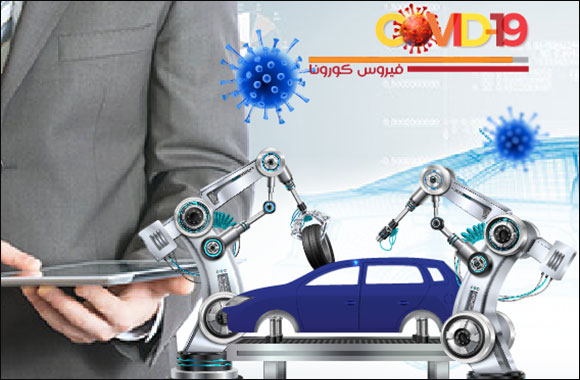
W7Worldwide's 7 Communications Strategies for the Automotive Sector to Navigate the Post Covid-19 Transformation
New Report: The world turns its back to petrol-fueled vehicles as it enters a new energy era
Riyadh: Analysis across industries suggests the global auto industry is emerging as a relatively strong performer in the recovery from the pandemic. The automotive sector’s level overall activity in Q2 of 2021 was running well above pre-Covid levels (measured at Q4 2019) and ahead of most other industrial sectors measured. Activity levels in the sector were 33.1% higher than they were at the end of 2019, before the pandemic impacted economies across the world.
Amid this transformation, there are bright prospects for electrified vehicles in the context of a green recovery to lift projections for the sector. In the Middle East region, countries like Saudi Arabia and the United Arab Emirates, are becoming early adopters of electric vehicles. Saudi Arabia said that at least 30% of cars in its capital would be electric by 2030, as the Kingdom pursues a net zero goal by 2060. The Middle-East and African electric vehicle market was valued at USD 35 million in 2020, and it is expected to reach USD 84 million by 2026, registering a CAGR of over 15% during the forecast period (2021 - 2026).
“The automotive industry has experienced disruption with external factors driving change, from new entrants to government legislation, but the biggest is new technology coupled with consumers’ ever-increasing expectations of how they want to experience a car brand.” says Abdulrahman Inayat, Co-Founder and Director of W7Worldwide. “Communicators need to be ready for ever-shifting consumer perceptions. Post Covid-19 consumers want to know what brands are doing to reduce emissions and prevent climate change, and how that applies to the car and company’s conduct.”
Having worked with top international automotive companies, W7Worldwide have formulated a 7-Step Guide to help incorporate the post COVID-19 market transformation into auto brand’s communications strategies. It’s not enough to talk about your car’s range, features, or sustainable material. Car brands must be clear on their purpose, illustrating the impact their investments have on consumers and society to connect the emotional and rational.
As consumer behaviour continues to change and become an increasingly online experience, auto brands need to find new ways of connecting with their customers and build trust in their brand. For any auto brand to lead the transformation in this sector, communicators must understand how to tell their innovation story credibly. Being viewed as cutting edge leads to positive brand outcomes in areas that go beyond product. The positive outcomes 'beyond product' are, being more likely to be loved, being seen as delivering amazing customer experiences, and being seen as doing good in society.
There are certain key automotive marketing messages that help consumers make their purchasing decision. These are Price, Safety, Status, Tech & features, fun & lifestyle, and environmental. While price-driven messages and impact videos of cars showing off its features and performance remain relevant, consumers are now seeking much more. This means going beyond traditional automotive marketing techniques to create more emotive content and crafting different environmental or safety messages to appeal to different communities or demographics.
Reducing carbon emissions to combat climate change is a pressing problem to which there are high expectations to find solutions and car makers are very much part of the solution in making progress toward achieving this aim. The automotive industry must now navigate an emerging and very different “new normal.”
Governments and cities have introduced regulations and incentives to accelerate the shift to sustainable mobility. Regulators worldwide are defining more stringent emissions targets as part of their country’s respective COP26 commitments. On the local level many cities are pushing ahead with regulations on car usage. The current challenge is to be able to balance the new demands of consumers, the contribution to slow climate change and new skills automakers need to deal with these shifts so as to deliver continued economic prosperity.
Home >> Automobile and Motoring Section
Tadej Pogačar claims UAE Team Emirates-XRG's 60th win of season at Tour de ...
Why Catrice's Blushin' Charm is the One Thing You Need as Your Travel Essential
Hilton Signs First Tapestry Collection by Hilton in Saudi Arabia with Al Musbah ...
SADAFCO Publishes 2024 Sustainability Report, "Empowering Sustainable Chang ...
Big Wins Continue with PrivilegePLUS at Mercato & Town Centre Jumeirah!
Discover the Flavours of the Ottoman Empire with Address Hotel Jabal Omar Makkah
Emirates A350 debuts in Dammam
Tadej Pogačar sprints to second in thrilling stage 2 at the Tour de France
IATA Comments on Misguided Solidarity Levy Proposal
Mercato Wows Visitors with Circus Spectacles, Iconic Slide, and Weekly Cash Priz ...
To Increase Capacity and Strengthen Supply Chains Minister Al-Jasser Lays Found ...
Aster Sanad Hospital Supports Saudi Talent at PSCEMS Career Day
G-SHOCK's Summer Style Statement: Metal-Cased Watches That Define the Season
UAE Team Emirates-XRG and Tadej Pogačar aim for fourth Tour de France title
Passenger Growth Hits 5% in May
João Almeida: Racing for Glory and Riding for the Team
May Air Cargo Demand Up 2.2% Despite Trade Disruptions
UAE Team Emirates-XRG take home five National Championship victories
Jeddah e-prix double-header becomes most-watched formula e weekend in history, d ...
In the Presence of H.E. Al-Jasser … Mawani Signs Privatization Contracts for Mu ...


